
(Announcement: Hey everyone, before we dive into this article. Here is a great news – With the EOY sale, Coursera Plus is currently available with $200 off (50% discount) – valid globally – until December 29, 2025. And, if you’re from India, it’s only INR 7,499/year. Don’t miss out on this massive sale.)
If you’re looking for an honest and unbiased review of Coursera, you’re in the right place.
Based on my personal experience, I’m going to tell you everything you need to about this learning platform Coursera, and whether it’s worth it.
Let me tell you some surprising facts about Coursera first:
With these facts, it’s proven that Coursers is a trustworthy and reliable learning platform.
Now let’s dive deeper into my comprehensive Coursera review where I’ll break down everything you need to know, including the good and bad aspects, content quality, pricing structure, popular courses, best alternatives, user experiences, success stories, and more.
For those wanting a quick overview, here’s my summarized review…
Summarized Review:
Coursera is a top-notch online learning platform that provides a wide range of courses in various subjects.
These courses are taught by instructors from top universities and industry leaders, making them a valuable resource for anyone seeking to upskill or advance their career.
If you’re looking for short-term, career-focused learning (3-6 months), consider Coursera’s professional certificate or specialization programs. They offer focused learning opportunities directly relevant to your career goals.
For those seeking a more in-depth academic experience, Coursera also offers online degree programs from prestigious universities worldwide. These programs provide a comprehensive curriculum leading to a recognized degree.
Why choose Coursera for learning?
Why not choose Coursera for learning?
Overall Rating: 4.6/5
Again, I’d encourage you to read the complete article before making any decision, that’s why I’ve featured many other learners reviews and success stories.
If you are ready, let’s start with a basic question…
What is Coursera and How Does It Work?
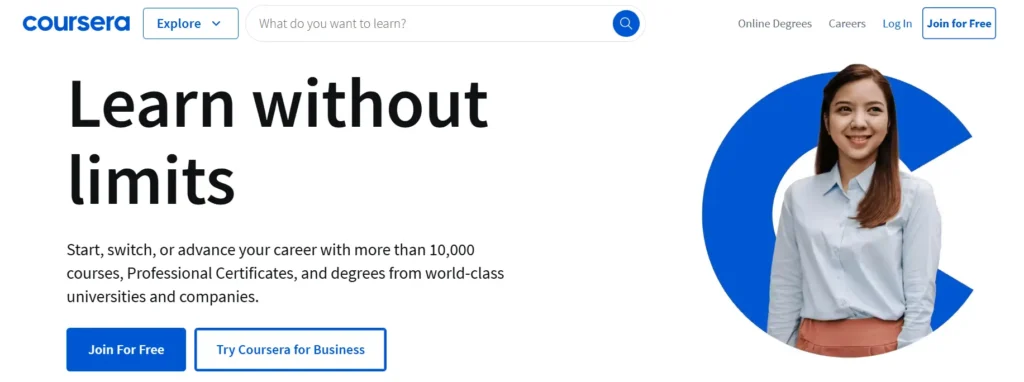
Coursera is an online education platform that offers courses, certificates, and degrees from leading universities and companies around the world.
Founded in 2012 by Stanford University computer science professors Andrew Ng and Daphne Koller, Coursera aims to provide affordable and accessible education to anyone with an internet connection.
Instead of traditional lectures and exams, Coursera relies on video lessons, readings, quizzes, peer-reviewed assignments, and community discussion forums.
It works by providing users with access to courses on various subjects, including computer science, business, humanities, and more. You can browse through the catalog of courses, enroll in the ones that interest you, and complete coursework at your own pace.
You may be surprised to know that Coursera has partnered with over 300 universities and companies worldwide.
Some of its notable partners include Google, IBM, Stanford, Facebook, IIT Bombay, Yale University, University of London, and Duke, among others. Together, Coursera offers a wide range of high-quality courses, degrees, and certificates.
For instance, you must have heard about Google Career Certificates. These certificates are created by senior practitioners at Google and provide you with job-ready skills in high-in-demand fields without any prior knowledge and experience.
Overview of Coursera’s key features and offerings:
As I mentioned in the beginning, Coursera is a leading and one of the most popular learning platforms.
Here is a quick overview of all its features and offerings (later we’ll go a little deeper into all these features)…
Now let’s discuss, who is Coursera best suited for…
Who is Coursera best suited for?
Coursera is suited for a wide range of learners who want to develop new skills and advance their careers. The platform offers flexible online learning options for:
Overall, Coursera serves all types of lifelong learners. Whether you want to achieve credentials, advance your career, enrich your life, or simply satisfy curiosity – Coursera offers flexible, accessible online education.
Course Selection on Coursera:
Coursera offers a diverse range of courses spanning various fields. Below are the subjects in which the platform provides over 10,000 paid and free courses:
- Data Science
- Business
- Computer Science
- Information Technology
- Language Learning
- Health
- Personal Development
- Physical Science & Engineering
- Social Sciences
- Arts & Humanities
- Math & Logic
Furthermore, these subjects encompass numerous sub-categories. For instance, Data Science comprises specialties such as Data Scientist, Data Analyst, BI Analyst, BI Developer, and Data Engineer.
Within each subject, you can pursue online degrees offered by leading universities or certificate courses. It’s your decision whether to pursue a degree or a certificate course on Coursera.
However, the extensive range of courses may leave you feeling uncertain about which one to choose for your learning and skill development. So, here are the courses offered on Coursera…
Online Degree Programs:
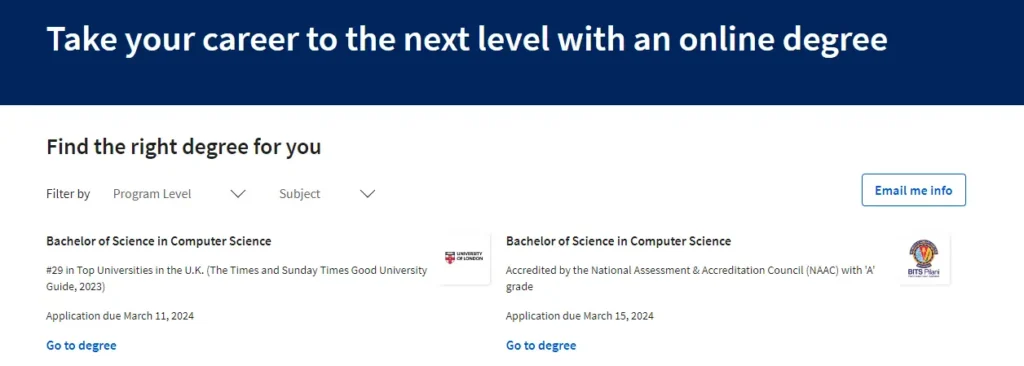
Coursera offers students the opportunity to pursue online degrees and certificates from leading universities. If you’re interested in obtaining a Bachelor’s or Master’s degree online from institutions like the University of London, Coursera is worth exploring.
While pursuing a degree online may seem unconventional, the programs offered through Coursera are taught by the same faculty as on-campus programs. The degree you earn is also equivalent to the on-campus version.
Advantages of pursuing online degree programs through Coursera:
- Earn your degree from prestigious universities without relocating.
- Access to the same high-quality instruction as on-campus students.
- Typically lower tuition fees compared to brick-and-mortar programs.
- Flexible schedule to fit studies around work/life commitments.
- Potential for financial aid for qualifying students.
- Credentials valued by major companies.
Based on your prior education, you can pursue a Bachelor’s degree, Master’s degree, or certificate program through Coursera’s university partners. The offerings span many categories, allowing you to advance your knowledge and career in your desired field. Later we’ll feature the best degree programs.
MasterTrack® Certificates:

If you want to gain expertise in areas like machine learning, data analytics, innovation management, entrepreneurship, UX design, cybersecurity, and more from top universities like the University of Chicago or Yale University, consider pursuing a MasterTrack® Certificate from Coursera.
These certificates are part of Master’s degree curricula split into modular online programs. This allows you to earn a high-quality, university-issued credential in a specific career field through a flexible, interactive online format.
These programs are available only in two languages English and Spanish, and typically take 4-7 months to complete.
To enroll in most MasterTrack® Certificate programs, you must have the required prerequisites, which generally include a Bachelor’s degree or equivalent experience. Specific admissions criteria can vary across universities and subject areas.
Further, with MasterTrack certificates, Coursera also offers Graduate Certificates and University Certificates which are almost similar but at graduation level.
Professional Certificates:
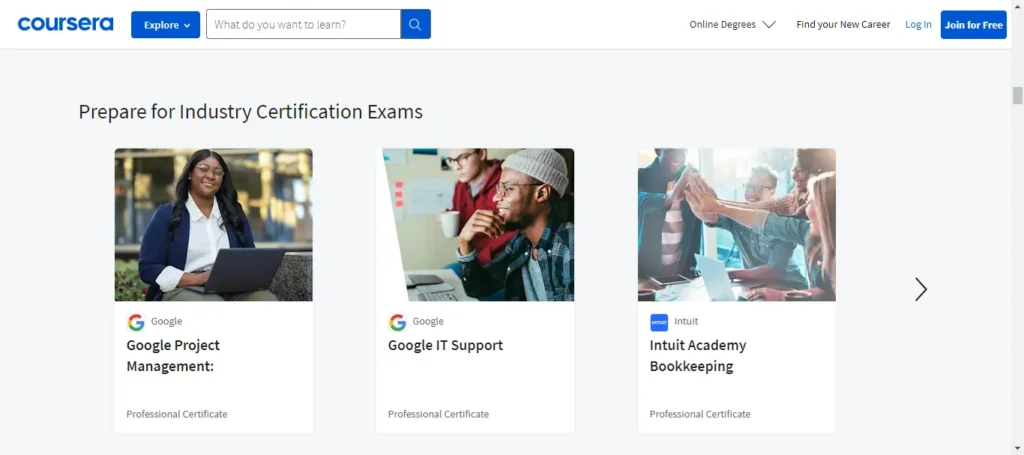
Professional Certificates on Coursera are designed to help you become job-ready for in-demand career fields in less than a year. Whether you’re looking to start a new career or transition into a different one, these Professional Certificates provide the skills and credentials to make you competitive in the job market.
If you want to pursue careers in fields like Digital marketing, IT support, data analytics, UX design, data science, cloud computing, and more, you can enroll in Professional Certificate programs created by industry leaders such as Google, IBM, Facebook, Salesforce, or Intuit.
The best part? You don’t require any prior knowledge and experience to pursue most of the professional certificates.
Each Professional Certificate consists of 4-8 individual courses. For example, the Google Project Management Professional Certificate includes courses like Foundations of Project Management, Project Initiation, Project Planning, Project Execution, Agile Project Management, and Capstone.
Later, we’ll also discuss the most popular professional certificates and their costs. So, keep reading…
Specialization Programs:
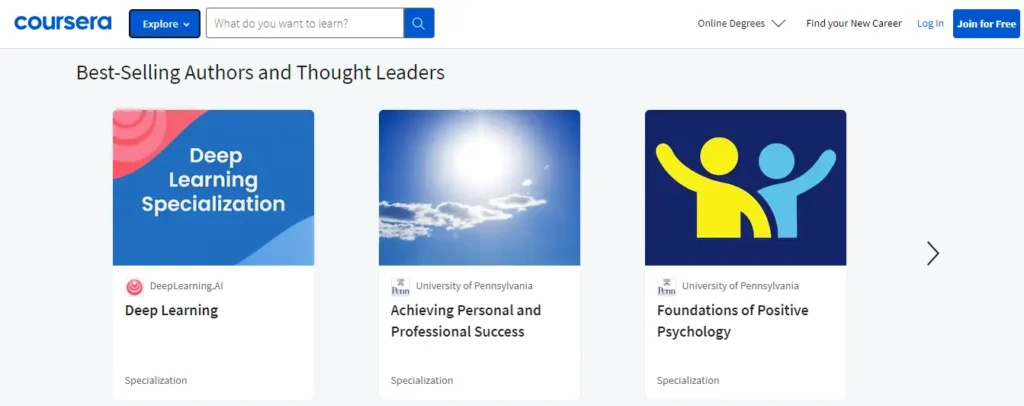
Coursera also offers Specialization programs that are similar to Professional Certificates in terms of pricing structure and average time commitment.
Like Professional Certificates, Specializations are comprised of 3-7 individual courses that you can enroll in separately or as a bundled program.
The goal of a Specialization is to provide rigorous, in-depth knowledge of a subject area by guiding you through an integrated series of courses, projects, and hands-on assignments from university faculty and top companies.
While Professional Certificates prioritize quickly building job skills for specific roles, Specializations offer a more comprehensive academic exploration into advanced topics, culminating in a Capstone project.
The pricing structure is also similar to professional certification which we’ll later discuss. You can choose Professional Certificates for rapid career upskilling or Specializations for deep mastery of a subject from a world-class university.
College Credits:
Coursera also offers College Credits with most of its professional certificates and specialization programs. These credits are units that measure learning at accredited colleges and universities in the United States.
According to federal guidelines, one college credit hour roughly corresponds to one hour of classroom learning plus two hours of independent work. The amount of time spent in class coupled with the expected workload outside of class determines the number of credits assigned to a course.
These credits are essential for accreditation, facilitating the transfer of credits between institutions, and establishing eligibility for financial aid. For
Here are some key benefits of college credits you earn from Coursera…
- Facilitated Transferability: College credits make it easier to transfer between accredited institutions, allowing you to continue your education seamlessly if you change schools or pursue further studies elsewhere.
- Financial Aid Eligibility: College credits are also used to determine eligibility for financial aid. Enrolling for a set number of courses each semester is often necessary to maintain eligibility for financial assistance.
- Structured Education: The assignment of credits helps clarify the type and extent of education received, making it easier to understand academic progress and fulfill degree requirements.
- Accelerated Degree Completion: By earning college credits efficiently, you can expedite the completion of your degree programs, potentially reducing the time and cost associated with obtaining a bachelor’s degree.
- Professional Development: College credits obtained through professional certificate programs can enhance career prospects by providing recognized credentials and demonstrating proficiency in specific skills or fields.
Overall, College credits or University credits are awesome and can be beneficial if you’re looking for further studies or any financial support.
Are Coursera Programs Accredited?
In the United States, accrediting bodies ensure that colleges and educational programs meet specific standards regarding coursework, faculty, facilities, resources, and student services.
For any training programs or learning platforms to gain accreditation, they must be approved by CHEA and the Department of Education in the USA. However, Coursera isn’t officially accredited by these authorities. Nevertheless, many of its professional certificates and specialization programs are recognized under the ACE Credit Recommendation.
It’s important to note that ACE Credit Recommendation isn’t the same as accreditation; rather, it evaluates formal education courses and programs for college-level credit, which can indicate quality similarly to accreditation. For further details on Coursera’s accreditation, you can refer to this article.
Guided Projects:
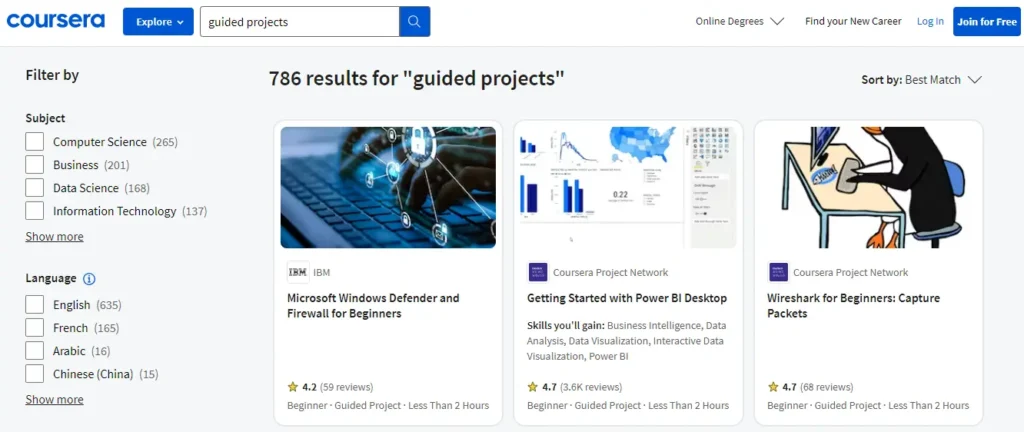
Coursera offers a unique feature called Guided Projects that allows you to quickly learn new practical skills in just 2 hours for a very affordable price, typically around $9.99 (or ₹788 INR). There are also some free Guided Projects available.
With Guided Projects, you can gain hands-on experience through an interactive, browser-based learning environment. No extra software installations are needed – you’ll have access to all the required tools and resources built right into the platform.
Whether you need to quickly upskill, get experience on tools/technologies you’re studying, or just want to learn something new in a fast and affordable way, Coursera’s Projects offers an extremely valuable and accessible opportunity.
Free Courses:
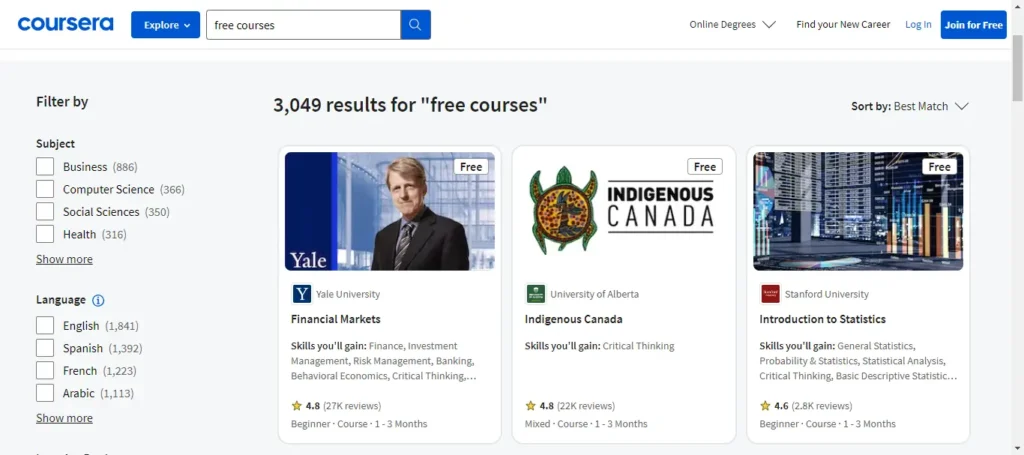
For those looking to learn new skills on a budget, Coursera offers over 3,000 free courses across a wide range of topics like machine learning, language learning, finance, marketing, and more. These free courses allow unlimited access to video lectures, readings, and practice exercises – no payment is required.
Most of Coursera’s free offerings are at the beginner or introductory level, making them ideal for developing foundational knowledge in a subject area. However, free courses typically do not include graded assignments, projects, or a completion certificate.
However, you can also earn a course of completion certificate by paying a small fee of around $10 (or, ₹2,407). Please note that these paid certificates hold little professional value for free courses. Employers rarely consider certificates from untested introductory courses as substantial credentials.
Coursera Plus:

If you plan to take multiple courses on Coursera, considering the Coursera Plus subscription can be more cost-effective. Coursera Plus provides unlimited access to over 6,000 courses, projects, specializations, and professional certificate programs for one flat yearly fee.
With Coursera Plus, you get:
- Access to over 90% of courses, guided projects, specializations, and professional certificate programs on the platform
- High-quality content taught by instructors from top universities and companies
- The ability to earn shareable certificates and credentials
- A 7-day free trial to test it out first
- 14-day money-back guarantee if you’re not satisfied
The key benefits are the unlimited learning access and potential cost savings compared to paying for each course individually. Popular courses in data science, business, computer science, and more are included.
Please note, that this subscription does not cover enrollment in degree programs MasterTrack certificates. Further, some professional certificates and specializations from specific universities are excluded. You can check this list for more information. You can also read also read my complete Coursera Plus review.
Quality of Instructors and Content:
Up until now in this Coursera review, I’ve focused mainly on the platform’s features, who is Coursera best for, and the various types of courses offered. Now let me share the quality of instructors and content…
Coursera is known for its high-quality instructors and content. The platform collaborates with top universities and institutions from around the world to offer courses taught by experts in their respective fields.
These instructors bring a wealth of knowledge and experience to their courses, ensuring that learners receive a comprehensive education.
In addition to expert instruction and diverse content, Coursera utilizes innovative teaching methods and technologies to enhance the learning experience. This includes interactive quizzes, peer-reviewed assignments, and video lectures that can be accessed anytime, anywhere.
My Learning Experience with Coursera’s Courses:
To properly evaluate Coursera, I made sure to take both paid and free courses spanning different subject areas like technology, business, health, and personal development. This gave me a well-rounded perspective.
I’ll be honest – Coursera does not necessarily provide the highest quality content across all topics and course types. Some of the free courses, especially in areas like health and personal development, tend to cover only basic information that may already be common knowledge.
For example, the free course “Stanford Introduction to Food and Health” largely covers fundamental healthy eating habits that many people are likely already familiar with. It doesn’t offer much new or advanced material.
However, when it comes to Coursera’s paid Professional Certificates, Specializations, and degree programs, the content quality is exceptional. The courses I took, like the Digital Marketing Professional Certificate from Google and Social Media Marketing Specialization from Meta, delivered immense practical value worth the cost.
Overall, Coursera’s commitment to quality instructors and content sets it apart as a leading online learning platform, attracting millions of learners from around the world who are eager to expand their knowledge and skills.
Feedback on course content quality and relevance:
Here are some user reviews and feedback for the Google Digital Marketing and E-Commerce Certification program. These user reviews and feedback you’ll find in all Coursera programs.
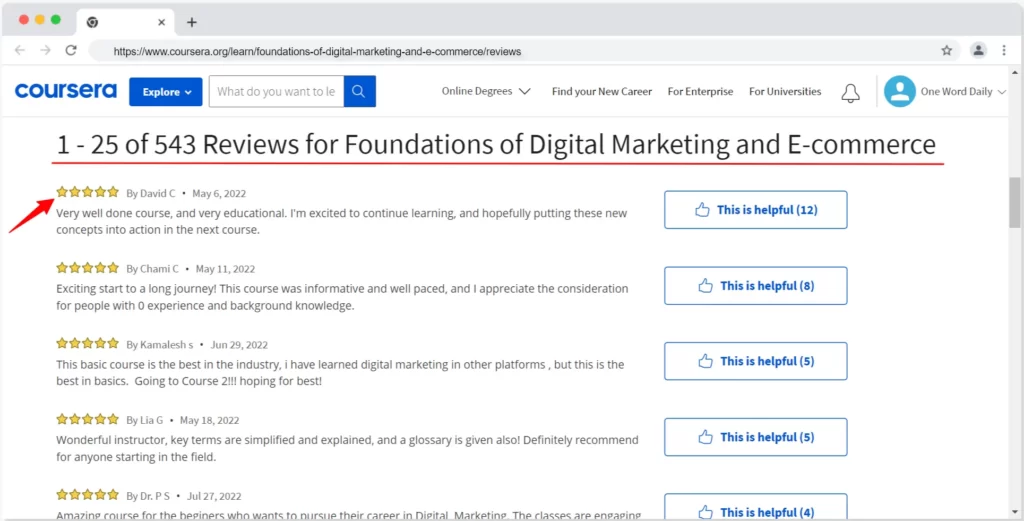
Here is another user review for Coursera’s Google IT Support professional certificate program that we found on Quora…

In fact, before reviewing any Coursera professional certification or specialization program, I also reached out to users to seek their reviews and feedback about the courses they have completed. I’ll also feature some of the users’ success stories later in this Coursera review.
Cost and Value of Coursera:
Now we have come at Coursera costs. Coursera has a little confusing price for its courses. It has different pricing for different ranges of courses. Let’s discuss its pricing structures for all programs…
Pricing Structure of Coursera Courses:
Here is a pricing table for all Coursera programs at a glance…
| Coursera Program | Costs | Costs (In India) |
|---|---|---|
| Degree Programs | $9,000-$50,000 | $9,000-$50,000 |
| MasterTrack Certificates | $2,000-$5,000 | $2,000-$5,000 |
| University Certificates | $1,000-$4,000 | $1,000-$4,000 |
| Professional Certificates | $39-$99 per month | ₹814- ₹1627 per month |
| Specialization Programs | $39-$79 per month | ₹1,619/month- ₹1627 per month |
| Guided Projects | $9.99 | ₹829 |
| Coursera Plus | $59 per month ($399 per year) | ₹4,897 per month (₹33,121 per year) |
Please note that the cost of professional certificates and specialization programs depends on the duration of access. For example, if you complete it in 3 months, you can expect to pay around $147 in total.
For 6 months of access, the cost is approximately $297. This variation in pricing applies in India and other countries as well. Further, these programs also come with a free audit.
Coursera Financial Aid:

Coursera also provides financial aid opportunities for learners who cannot afford to pay full price for courses. You can apply for financial aid through the course page by clicking on the “Financial aid available” link.
Then, you need to fill out a form that includes details about your financial situation and why you require aid to access the course. Coursera reviews these applications and grants aid accordingly. With financial aid, you can receive a full or partial fee waiver for the course you choose.
Scholarships on Coursera:

Coursera partners with universities, companies, governments, and nonprofit organizations to offer scholarships for specific certificate courses or specializations. These scholarships may cover the cost of specific courses or entire Specializations.
The eligibility criteria and application process for scholarships vary depending on the sponsoring organization and the specific scholarship opportunity.
To find such scholarship opportunities, you can search on Google as Coursera Scholarship for “Your Country”. If there are any scholarships offered on Coursera, they will appear on your personalized Coursera dashboard.
User Experience on Coursera:
Coursera provides a user-friendly experience for online learning. The platform offers a vast array of courses taught by experts from top universities and institutions worldwide.
Users can easily navigate through the website or mobile app to find courses based on their interests or career goals. The interface is intuitive, with clear instructions on how to enroll in courses, access materials, and interact with instructors and fellow learners.
Coursera also offers features such as quizzes, assignments, and discussion forums to enhance the learning experience.
Navigating the platform: How user-friendly is Coursera?

If you’ve taken a tour of the Coursera site, I’m sure you must have been satisfied with its easy-to-use and easy-to-navigate interface. Coursera has a filter system to help you find a course that meets your needs.
For each course, Coursera provides comprehensive information, including details about the instructors, syllabus, reviews, enrollment options, and FAQs. Along with the syllabus, you can also get an idea about the complete course curriculum within a Professional Certificate or Specialization. Moreover, you’ll know what skills you’ll gain after pursuing a particular course.
After enrolling in a course, you’ll have a flexible deadline and an estimated time to complete it. Additionally, Coursera offers courses in 40 languages along with subtitles so that you can learn better in your native language.
Furthermore, Coursera has a mobile application that allows you to access and take courses on the go, enhancing the overall learning experience’s flexibility and convenience.
How to Create A Coursera Account?
If you’re ready to create a Coursera account, here are the steps to follow…
- Visit Coursera.org
- Click on Join for Free
- Choose whether you want to provide a name, email, and password or link your Coursera account to your Facebook profile, Google account, or Apple ID.
- Congratulations! Your account has been created.
Once you’re done, you’ll directed to your student dashboard. When you enroll in any course, it will appear on your learning dashboard as ‘In-Progress’ or Complete (when you complete it).
While enrolling in any course, you’ll be also asked a few basic questions about your profession, learning goals, and others so that they can send you the course notification as per your requirements.
Community and Support on Coursera:

Coursera provides help and support through various channels, including its Contact Us page, Learner Help Centre, and FAQs.
On Coursera’s support page, you’ll find hundreds of articles and guides addressing users’ issues. Popular Community Conversations offer assistance too. For example, if you seek a Data Science roadmap for beginners, community members provide valuable suggestions.
Moreover, Coursera offers job training and career mentorship, covering resume building, LinkedIn profile optimization, and more, in many of its professional certification and specialization programs.
Through forums, social media groups, and virtual events, learners worldwide can discuss topics, share insights, and build relationships. Coursera collaborates with universities, organizations, and industry leaders, offering exclusive networking events, career fairs, and mentorship programs.
However, some complaints exist about Coursera’s customer service being subpar. Forum moderators in groups may also be less active and slow to respond. Further, in discussion forums any course instructors are likely to participate.
Note that despite offering excellent professional certificates and specializations, Coursera does not guarantee employment.
Coursera Reviews: Success Stories
If any learners get a job or can upskill themselves after taking a Coursera course then I’ll consider it as successful.
As I mentioned, before writing for any Coursera course, I reach out to many users who have completed the course to seek their feedback and whether taking the Coursera course helps in their career.
Now I’m going to feature some real-life testimonials from Coursera learners. With these reviews, you can understand the impact of Coursera courses on career advancement and skill development.
For Google Digital Marketing and E-Commerce program on Coursera:
In the program, I liked the exposure to various learning methods that easily resonated with me and gave practical insight into every aspect of E-Commerce and Digital Marketing. However, it didn’t include a predesigned Capstone project, which left me feeling disappointed. I did learn different ways to optimize various online platforms for Digital Marketing. In my opinion, the program felt more like a compilation of self-study materials rather than a structured curriculum aimed at enhancing one’s profile. It lacked organization and a cohesive structure. In a nutshell, the program provided an opportunity to learn several separate skills in one place.“
For Google UX Design Professional Certificate:
I’m thoroughly impressed. The course perfectly balanced theory and application, utilizing real-world examples to clarify concepts. The instructor’s expertise was evident, and the practical assignments mirrored industry challenges. The course community was invaluable, fostering insightful discussions. While minor technical issues occasionally emerged, the support team swiftly resolved them.
This course has equipped me with a strong UI/UX foundation and ignited my passion for the field. I’m excited to continue my UI/UX journey and would highly recommend this course to anyone delving into UI/UX design.
– by Jayesh Sarode
Here is a YouTube video from Richard Walls, who shares his five-year learning journey experience on Coursera and how it transformed his life…
In this video, I’ve also noticed some amazing comments from learners about Coursera and how its programs have benefited them. Take a look at the screenshot below:
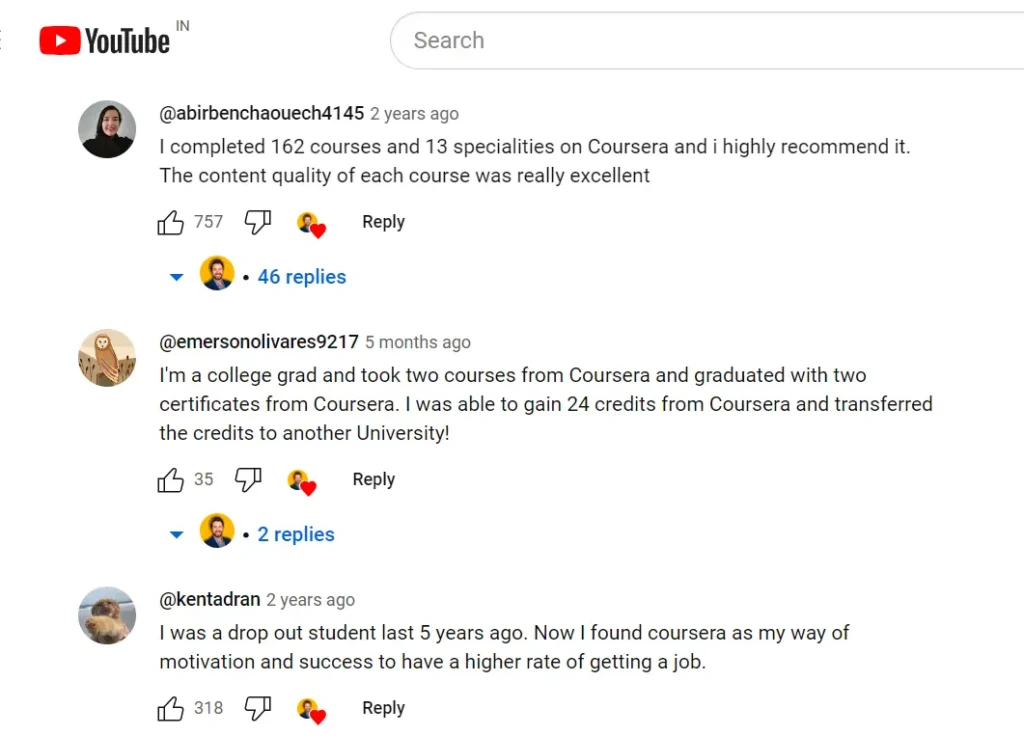
I have also Coursera reviews and ratings on forum and community sites such as Trustpilot and G2.
Most users there mentioned two major drawbacks of Coursera: Poor customer support and difficulty with getting refunds.
However, I didn’t find negative comments about the quality or usefulness of Coursera’s content.
To give you a clear picture, I’ll now share Coursera’s major pros and cons, as well as some tips for finding the best Coursera courses.
Pros and Cons of Coursera:
Coursera also has its pros and cons that are worth mentioning in this Coursera review. I gathered these pros and cons from many user reviews and my experience of using it for three years.
Advantages of using Coursera for online learning:
Common challenges faced by Coursera users:
Our Overall Ratings: 4.6/5
5 Simple Steps to Find the Best Coursera Course:
With hundreds of courses available on a single subject from various universities and companies on Coursera, it can be challenging to select the best one for your learning needs.
Therefore, consider following these five simple steps to find the right Coursera program…
Bonus Tip: Audit a few free introductory lectures before enrolling in a paid course. This allows you to assess the instructor’s presentation, content quality, and overall course structure to ensure it’s a good fit for you.
By following these steps, you’ll be well-equipped to navigate the vast landscape of Coursera courses and identify the perfect one to meet your learning goals.
Most Popular Coursera Courses in 2025:
In the world of online education, if you see Coursera as a valuable tool for your learning and career growth, let me share the most popular Coursera courses in 2025.
In Degree Programs:
- Bachelor of Science in Computer Science
- Bachelor of Science in Data Science & AI
- Master of Applied Data Science
In MasterTrack Certificates:
- Social Work MasterTrack® Certificate
- Sustainability and Development MasterTrack Certificate
- Instructional Design MasterTrack® Certificate
In University Certificates:
- Innovation Management & Entrepreneurship University Certificate
- Post Graduate Certificate in Data Science and Machine Learning
In Professional Certificates:
- Google Data Analytics Professional Certificate
- IBM Data Science Professional Certificate
- Google IT Support Professional Certificate
In Specialization Programs:
- Python for Everybody Specialization
- Excel Skills for Business Specialization Program
- Architecting with Google Compute Engine Specialization
In Guided Projects:
In Free Courses:
Personal Recommendations for Using Coursera:
Having used Coursera for over three years, I’d like to share some personal recommendations also that I found helpful.
These tips can be beneficial if you’re interested in pursuing any certification program or other courses…
To make the most of Coursera, don’t rush into buying any paid courses on impulse. Coursera often gives big discounts on all its programs.
Just bookmark our Coursera discount page to stay in the loop. Following these tips will help you learn better and reach your goals faster.
Best Coursera Alternatives:
Coursera is not the only online learning resource available on the internet. Here are some of the best competitors and alternatives to Coursera that you can also explore:
Coursera vs. Udacity

Udacity is also a great online learning platform offering courses mostly in high-demand tech fields such as programming, data science, cloud computing, AI, autonomous systems, cybersecurity, and more.
Unlike Coursera, Udacity’s online programs are created by experts and professionals in collaboration with top companies worldwide. These programs, known as Nanodegrees, are not accredited by educational institutions like Coursera but are recognized by some of Udacity’s partners.
Udacity’s programs also focus on practical skills with hands-on learning and real-world projects. However, their programs are a bit more expensive compared to Coursera courses. I have also published a detailed review of Udacity that you may also check out.
Coursera vs. Udemy:

Udemy is also one of the most popular online learning platforms offering courses in a variety of subjects. Unlike Coursera, Udemy courses are created by individuals with subject matter expertise who are willing to teach others.
You can use Udemy for skill-building, learning the latest skills to fill your knowledge gaps, and pursuing hobbies. Their courses are also affordable.
However, it’s important to note that Udemy certificates are not legally valid or accredited by any educational institutions, so they may not be helpful for job and career prospects. Nevertheless, the skills you gain remain valuable.
Handpicked Related: Udemy vs. Coursera vs. Udacity vs. Edx- Which is best?
Coursera vs. Edx

Coursera and edX are almost similar learning platforms. Like Coursera, edX also offers a range of online degree programs and professional certification programs from prestigious universities and leading tech companies worldwide, although they are a bit more expensive compared to Coursera’s prices.
One aspect to note here is that Coursera offers a broader range of courses, while edX leans towards rigorous academic content. EdX courses are primarily in academic fields such as science, engineering, and humanities.
Coursera Vs LinkedIn Learning:

LinkedIn Learning, integrated with the LinkedIn platform, offers a vast library of courses covering business, technology, and creative skills. It emphasizes career development and networking, with courses tailored to industry demands.
Coursera focuses more on structured learning with university-backed content, while LinkedIn Learning offers flexibility and a focus on practical skills for professional advancement.
One thing to note here is that, like Coursera, you can’t purchase LinkedIn programs separately. Their courses can only be accessed by taking its membership subscription.
Choosing between them depends on whether one seeks formal education or skill enhancement aligned with career objectives and networking opportunities.
Coursera for Business, Universities, and Government:
So far in this Coursera review, I’ve focused on Coursera for individuals who want to pursue and enhance their skills with Coursera courses.
However, I must mention that Coursera also offers programs for businesses, universities, and governments.
Let’s quickly discuss them, and then we’ll explore some Coursera FAQs to complete this Coursera review.
Coursera for Business:

Coursera for Business is a program designed to help companies train their employees effectively. It offers access to thousands of courses taught by top instructors from leading universities and companies worldwide.
With Coursera for Business, companies can tailor learning paths to meet specific skill needs and business objectives. The platform provides tools for tracking progress and measuring the impact of learning on employee performance.
Coursera for Business aims to empower organizations to upskill their workforce, stay competitive, and drive innovation in the ever-evolving business landscape.
Coursera for Government
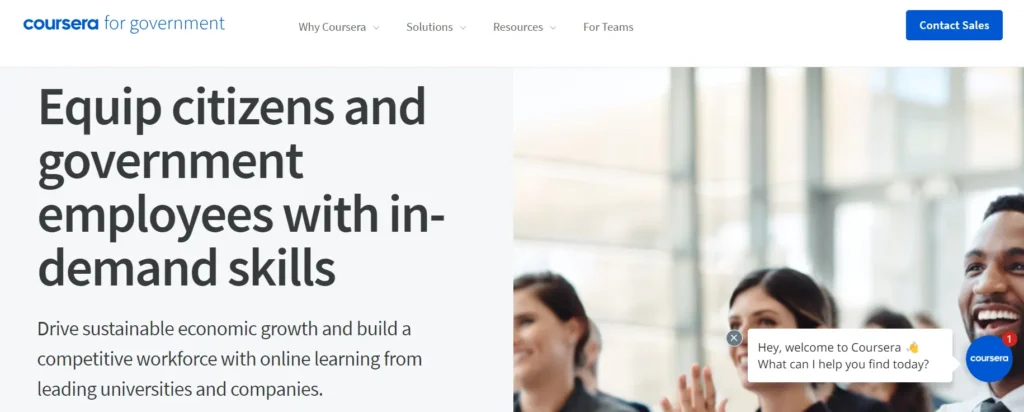
If the government wants to help people learn new skills and improve the abilities of public workers for important jobs that help the economy and create jobs, they can use Coursera.
Through Coursera, they can provide online courses from top universities and companies to help create a strong workforce and make the economy better. Coursera partners with governments in over 100 countries and more than 25 states in the United States, according to records.
Coursera for University (or Campus)
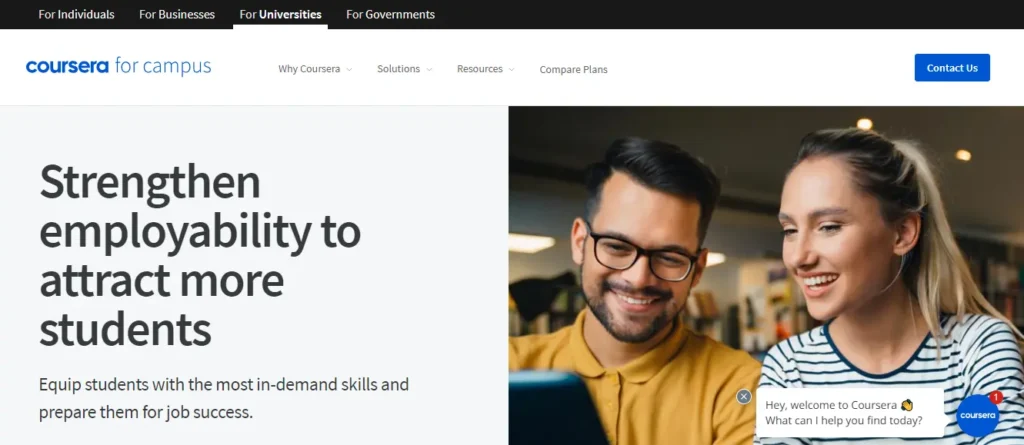
Coursera offers top-notch, job-relevant online learning for students, faculty, and staff through Coursera for Campus.
Universities can equip their students for sought-after jobs by providing skills training and Professional Certificates from leading companies worldwide.
Any campus can enhance its students’ job prospects and update its curriculum by accessing over 5,000 courses, 70 Professional Certificates, and 1,900 Guided Projects across various fields such as Engineering, Management & Commerce, Science, Liberal Arts & Humanities, and Healthcare.
Now It’s your turn:
So, in this Coursera review, I’ve covered everything you need to know about it, including all the major pros and cons based on my experience and some research.
Now I’d like to hear from you: Do you have any thoughts or questions about Coursera? And, are you satisfied with my Coursera review?
Let me know in the comments.
Coursera FAQ’s
Is the Coursera certificate worth it?
The value of a Coursera certificate largely depends on your goals and the specific course or specialization you’re considering. In general, Coursera certificates can be beneficial for personal growth and learning new skills, particularly if you’re looking to transition into a new career or field. Adding their professional certificates to your resume and LinkedIn profile can further demonstrate your knowledge and skills to potential employers, especially in fields where the course content is directly relevant.
Why Coursera is bad?
Coursera is one of the best e-learning platforms I have come across. The only thing I find in bad in Coursera’s users reviews is refunding issues and lack of customer service.
Are Coursera certificates recognized?
Coursera professional certificates are increasingly recognized and valued by many employers, universities, and professional organizations, particularly when the courses align with relevant job skills and come from reputable institutions. However, they are not as widely accepted as formal degrees, but they can still demonstrate self-motivation, commitment to learning, and the acquisition of new skills.
Coursera Courses I’ve Reviewed:
So far, I have reviewed many Coursera paid programs individually. If you’re interested in any of these courses, make sure to read the complete review.
- IBM Cybersecurity Analyst Professional Certificate Review
- Google UX Design Professional Certificate Review
- Google Digital Marketing and E-Commerce Professional Certificate Review
(To support my writing, I may use affiliate links in this post. Rest assured, they don’t affect my reviews.)

